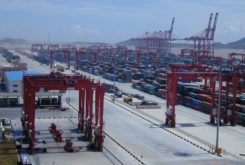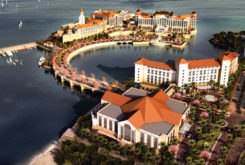The Cabo Verde banking system started a process of rapid change in 2017. A new reality is visible now that the second largest bank is in the hands of the State; and for the other banks, there is a diversification of the origins of foreign capital, including Macao.
The Cabo Verdean state took control over the country’s second largest bank, Caixa Económica de Cabo Verde (CECV) last February, a process that had dragged on since 2017 due to resistance from the General Audit of the Securities Market (AGMVM), whose previous entities in charge considered the launch of an Initial Public Offer (IPO) to be mandatory.
With the purchase of the 12.7% held by the insurance company Ímpar in the CECV by the National Social Security Institute (INPS), together with holdings of other public entities, Cabo Verde State became the largest stockholder.
The investment company Geocapital is the second largest shareholder of CECV.
Maria Encarnação Silva Rocha was replaced as Auditor-General in the AGMVM in August 2017 by Pedro Lima da Rocha, who, after initial resistance, ended up accepting the government’s intentions and letting the operation proceed without IPO.
The CECV is listed on the Cabo Verde Stock Exchange and the AGMVM operates under the Governor of the Bank of Cabo Verde, with management and administrative autonomy.
The capital received by Ímpar was used by the company to acquire the participation of the Banco Internacional do Funchal (Banif) in the Banco Cabo-verdiano de Negócios (BCN), taking over the management of this bank with 51% of the capital.
The CECV process was conducted in secrecy by the government of Ulisses Correia e Silva, who saw in the operation the potential for the state to have a greater intervention in the financial sector, dominated by foreign capital, mainly Portuguese.
The objectives of the transaction were also to put pressure on the market leader of the Portuguese State financial group Caixa Geral de Depósitos (CGD), Banco Comercial do Atlântico (BCA), through increased competition, to make financing available under more attractive conditions, being the high interest rates practiced one of the biggest obstacles to the business sector.
Following this operation, changes are now being made to Banco Interatlântico (BI), also owned by the Portuguese state group CGD, which will be merged with BCA, after no significant proposals for its purchase came forward, within the deadline established for sale.
In private contacts with local CGD managers and at the level of group management, the government has abandoned reservations initially raised to the merger. This decision was based on the size of the BCA, already the largest financial institution in the country, after the merger of the two banks.
BCA has lost market share in favor of Caixa Económica de Cabo Verde, which recently benefited from the absorption of the assets and liabilities of the defunct Novo Banco. Meanwhile, BAI (Angola) has been gaining market share.
Influential Cabo Verdean entrepreneurs advocated that the government should intervene so that BI can be bought by CECV, as a way of strengthening this bank, now owned mostly by the state. BCA is accused of essentially financing projects of Portuguese entrepreneurs, as well as of practising high interest rates.
CGD’s tacit agreement with the Cabo Verdean government also involves the extinction of Promotora, a financial holding company majority owned by CGD, whose assets (about 4 million euros) will go to Pro-capital, the guarantee fund of the newly created Pro-Empresa.
The Promotora has interests in the Sociedade Cabo-Verdiana de Tabacos, Ocean Project – Imobiliária e Construções, Hiperpeças – Sociedade de Manutenção e Teste de Viaturas, Auto Shop Cv, Promoleasing – Sociedade de Locação Financeira e Cafés de Cabo Verde.
Government sources recently said that with the extinction of the Promotora, created in 1996 within the process of modernization of the financial sector, Pro-Empresa would assume risk capital operations.
The solution appealed to CGD, which was no longer interested in maintaining this venture capital financial institution.
The shareholders of Promotora are CGD, with 40%, Cabo Verde State, 26%, Garantia Seguros, 11%, INPS, 11%, and BCA, 11%.
The INPS, the entity with the greatest financial resources available in the Cabo Verdean economy, has recently reviewed its capital investment strategy, increasing the weight of income in financial institutions abroad.
An investment of 600 million escudos (about 6 million euros) in the African Export-Import Bank (Afreximbank) by INPS has already been decided, while on the domestic front deposits in the BCA will be reduced.
In the short term, the banking sector should have new foreign players, namely IIBG Holdings, a company incorporated in Bahrain, in the Middle East. With authorization by the central bank, IIBG Holdings will purchase 90% in the capital of the Banco Internacional de Cabo Verde (BICV) from Novo Banco (Portugal) at the end of May.
The sale agreement was made in the second attempt to divest the financial institution after having failed to sell a group of investors led by Portuguese businessman José Veiga in 2016.
The BCV also passed the licensing process of Banco Sino-Atlântico (BSA), by Macau businessman David Chow.
Alongside the Portuguese-owned banks that dominate the sector, the creation of a Cabo Verdean bank with Chinese capital is seen with strong reserves, especially due to the potential loss of market share.
As a result of an agreement signed in May 2017 between the government and Chow’s Legend Globe Investment Company Ltd, the BSA is expected to be responsible for the capital movements of the casinos that the company intends to install in the tourist complex that is being built in Ilhéu of Santa Maria, in Praia, an investment valued at 250 million dollars.
Through the bank, the project pretends to attract Chinese capital to operate in West Africa, as the government intends.
Cabo Verde attributed to the company of David Chow, a gaming concession valid for 25 years for the island of Santiago, 15 of them in regime of exclusivity.



